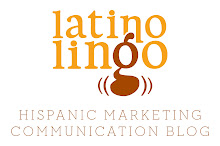It's the specialization, stupid
The 2008 Multicultural Marketing survey from the Association of National Advertisers (ANA) is out and only 45% of respondents indicated satisfaction with the results of multicultural initiatives, and 26% said that they are somewhat or very dissatisfied with the results.
Looking at the results we find that:
-- Only 22% feel that their firms have a high degree of knowledge and disciplined best practices.
-- Inability to integrate multicultural programs consistently into the overall marketing mix.
-- Only slightly more than half (57%) of respondents defined multicultural marketing as "narrowcasting or having a separate message for distinct market segments and communicating via media that reach multicultural consumers
--More than 20% are using seemingly less sophisticated approaches.
-- 11% report using a "mainstreaming" strategy (re-purposing general advertising approaches to appeal to multicultural segments)
-- 10% simply translate general marketing materials for media catering to multicultural audiences.
While this may sound controversial to many, a multicultural approach is a waste of time, resources and budgets. Most companies can't do 1 market segment (Hispanic, African-American, Asian, etc.) right. How can they then do all right?
With more of a focus on diversity than on driving business growth, many companies and organizations have sought to do "multicultural marketing" to appeal to one and all. Certainly this sounds great on paper, I mean who isn't searching for that Utopian world where we all hold hands singing Kumbaya?
However, the reality is that each market requires a distinct approach, distinct messaging, distinct strategies and distinct tactics. Cultural relevance is the name of the game, not getting general market campaigns out in as many languages as possible. The challenge, as nearly 6 of 10 said in this study, is that budgets do not allow for such specialized segmentation on so many fronts.
To answer this call, many multicultural agencies have popped up. At least from the ones I've seen and the one's I'm familiar with, multicultural agencies are also not equipped to do the job right even if they had the financial resources. Most, at least the ones I'm aware of, started as a specialized agency and someone, brilliant of course, at a meeting said, "why eat just one slice of bread when we can go after the whole loaf?" Give that guy or gal a raise!
Instead, companies should really look diligently at what ethnic market best provides for strong corporate growth. Where can they truly increase their market share? Who does their product or service really appeal to? Then, put the necessary resources into doing it right. Chances are, you're competitor isn't even doing that much. Marketing to a multicultural audience shouldn't and can't be thought of from a diversity perspective.
In summary, if you can't put the necessary resource to targeting everyone properly in a way relevant to each culture, put the right resource into the market that will increase business.
Looking at the results we find that:
-- Only 22% feel that their firms have a high degree of knowledge and disciplined best practices.
-- Inability to integrate multicultural programs consistently into the overall marketing mix.
-- Only slightly more than half (57%) of respondents defined multicultural marketing as "narrowcasting or having a separate message for distinct market segments and communicating via media that reach multicultural consumers
--More than 20% are using seemingly less sophisticated approaches.
-- 11% report using a "mainstreaming" strategy (re-purposing general advertising approaches to appeal to multicultural segments)
-- 10% simply translate general marketing materials for media catering to multicultural audiences.
While this may sound controversial to many, a multicultural approach is a waste of time, resources and budgets. Most companies can't do 1 market segment (Hispanic, African-American, Asian, etc.) right. How can they then do all right?
With more of a focus on diversity than on driving business growth, many companies and organizations have sought to do "multicultural marketing" to appeal to one and all. Certainly this sounds great on paper, I mean who isn't searching for that Utopian world where we all hold hands singing Kumbaya?
However, the reality is that each market requires a distinct approach, distinct messaging, distinct strategies and distinct tactics. Cultural relevance is the name of the game, not getting general market campaigns out in as many languages as possible. The challenge, as nearly 6 of 10 said in this study, is that budgets do not allow for such specialized segmentation on so many fronts.
To answer this call, many multicultural agencies have popped up. At least from the ones I've seen and the one's I'm familiar with, multicultural agencies are also not equipped to do the job right even if they had the financial resources. Most, at least the ones I'm aware of, started as a specialized agency and someone, brilliant of course, at a meeting said, "why eat just one slice of bread when we can go after the whole loaf?" Give that guy or gal a raise!
Instead, companies should really look diligently at what ethnic market best provides for strong corporate growth. Where can they truly increase their market share? Who does their product or service really appeal to? Then, put the necessary resources into doing it right. Chances are, you're competitor isn't even doing that much. Marketing to a multicultural audience shouldn't and can't be thought of from a diversity perspective.
In summary, if you can't put the necessary resource to targeting everyone properly in a way relevant to each culture, put the right resource into the market that will increase business.

